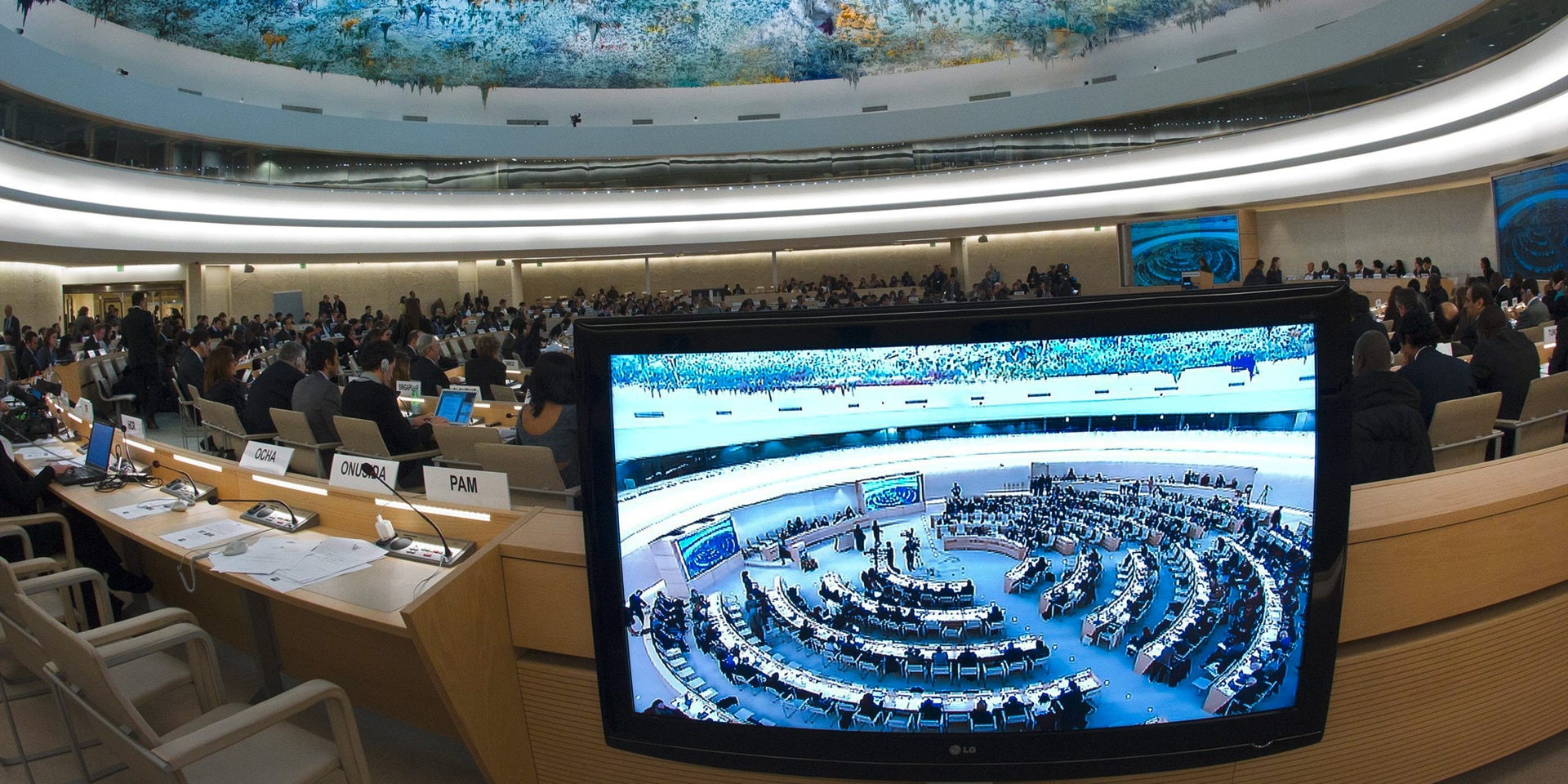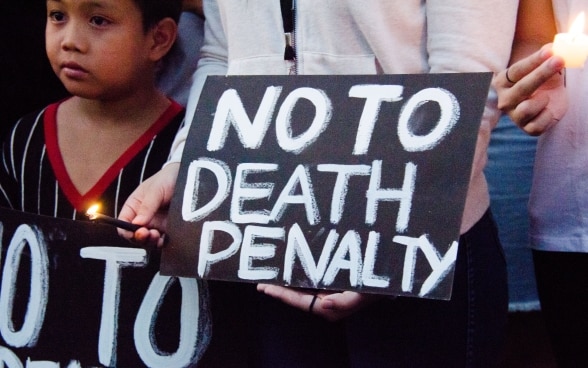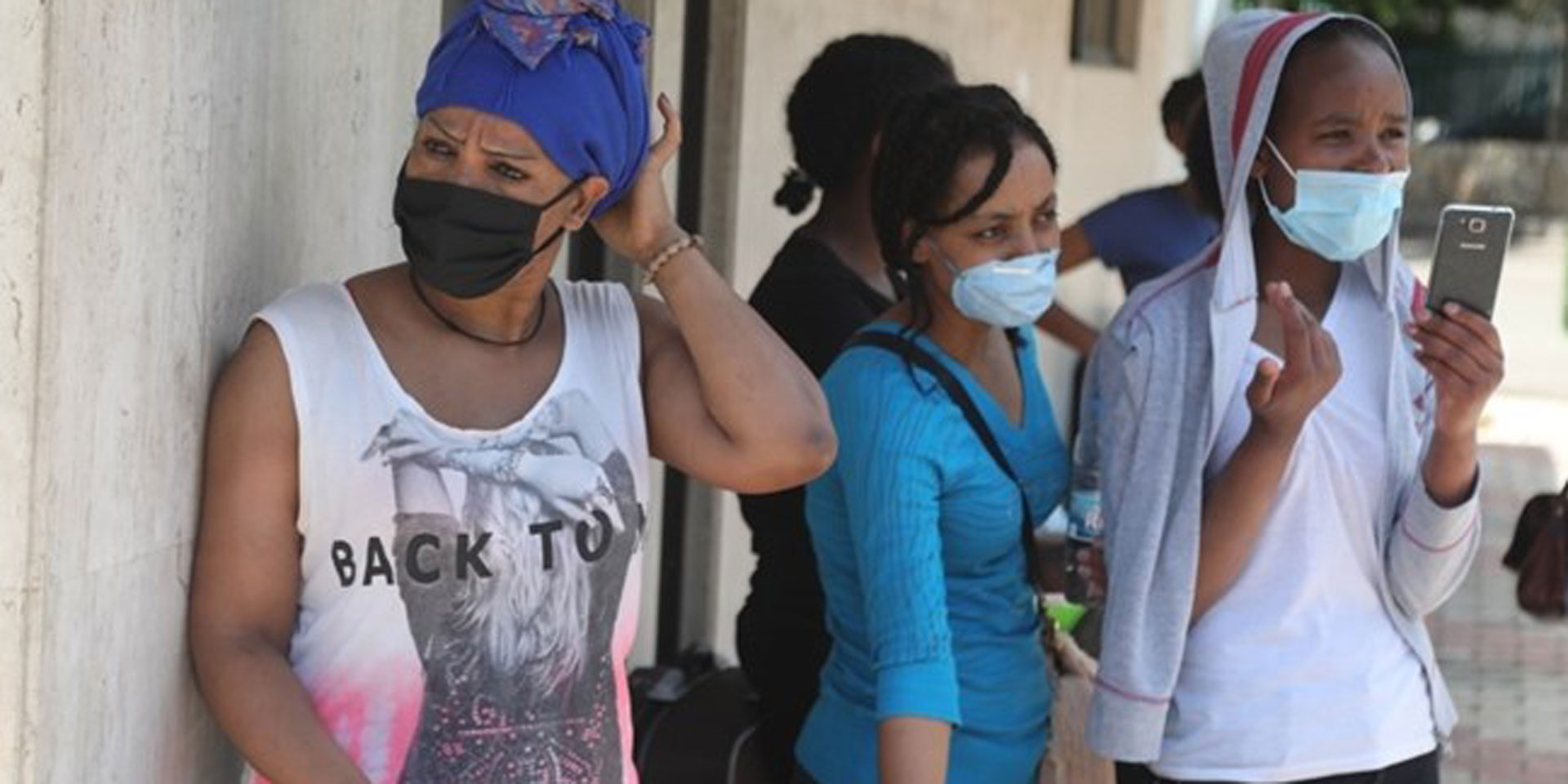Actively promoting respect for human rights with the help of digital technology
The respect of human rights forms the foundations for a lasting peace. This is the guiding principle behind Switzerland's commitment at the multilateral level, and the message is clear on 10 December, on the occasion of International Human Rights Day. In this context, we will look at Switzerland's joint action to abolish the death penalty and hear the story of a man condemned for an offence he allegedly committed as a minor.

Switzerland strengthens the universality of human rights through effective international institutions, including the UN Human Rights Council in Geneva. © Keystone
It was the afternoon of 31 December when I received a WhatsApp message from the Office of the High Commissioner for Human Rights alerting me of the imminent execution of a young person in a country in which Switzerland is frequently active. In 2014, then aged 17, he appeared to have been responsible for the death of a girl. Immediate action was taken to find an alternative solution, in accordance with international law. An intervention was possible a few hours before the New Year. The Swiss officer sent an SMS to the point of contact at the Ministry of Foreign Affairs, while an ambassador in Bern wrote to the person responsible in the country concerned. We were subsequently relieved to learn that the execution had been stayed, not only thanks to Switzerland's intervention and pressure from the international community but also thanks to the families involved, who had reached a compromise. The boy's life had been spared, for now.
For a world without the death penalty
On Human Rights Day, Laurence Strübin, diplomatic officer at the FDFA Section for Human Rights Policy, shares this story and reminds us that commitment to human rights and the abolition of the death penalty is more than a political issue: it can change someone's fate. Her account helps us to understand the importance of Switzerland's role as a credible actor in the defence of human rights. Switzerland has a solid international collaborative network allowing it to act quickly, effectively and coherently, aided also by digital technology.
Although international law prohibits the death penalty for all offenders that were underage at the time the crime was committed – and this is also affirmed by the Court of Human Rights – over one hundred people worldwide remain unjustly sentenced.
Together with the United Nations and civil society organisations, Switzerland endeavours to ensure that international law is respected, particularly by the states parties to the Convention on the Rights of the Child. The FDFA has established a rapid response system in the event that it receives warning of an imminent execution, allowing it to take action in Switzerland and in the country concerned – alone or in concert – in order to find an alternative solution to capital punishment.

International legal framework and effective institutions protecting human rights
Abolishing the death penalty worldwide by 2025: this is the goal pursued by Switzerland, through bilateral and multilateral instruments as well as projects, programmes and initiatives carried out in the field, in collaboration with international organisations, civil society and the private sector.
How close are we to achieving this goal? According to data provided by Amnesty International, by the end of 2019, 106 countries (the majority of the world's states) had abolished the death penalty in law for all crimes, and 142 countries (more than two thirds) were abolitionist in law or practice. The number of executions has also decreased over the years.
In general, Switzerland strengthens the universality of human rights through an international legal framework supported by effective institutions, including the UN Human Rights Council in Geneva and the bodies of the Council of Europe and the Organization for Security and Co-operation in Europe (OSCE).
In order to translate this priority into concrete actions, Switzerland launched its Action Plan on the Universal Abolition of the Death Penalty. An effective line of action is to directly encourage the states concerned to abolish capital punishment.
Multilateral engagement and Inter-Regional Task Force

Switzerland is among the states most actively involved in the negotiations on the resolution on a moratorium on the use of the death penalty, presented biennially in New York. This autumn, within the framework of the Third Committee of the United Nations General Assembly, Switzerland, together with Mexico, facilitated the resolution on behalf of the Inter-Regional Task Force, a group of states from various regions of the world.
The resolution is not legally binding but constitutes a call from the highest political body of the United Nations to its member states to adopt a universal moratorium on the use of the death penalty. In 2018, the resolution was adopted by a record number of states, with 121 countries voting in favour of the text.
One of Switzerland's main objectives this year is to increase the number of positive votes as an international political symbol. The General Assembly vote will be held on 16 December 2020.
Action at the local level: the example of Indonesia
Thanks to the FDFA's support for a non-governmental organisation and its local partner, the Swiss government encouraged a factual debate on drug policy reform in Indonesia, including the abolition of capital punishment for drug-related offences. The project found an innovate means of placing these issues within the context of Indonesia's commitment to the sustainable development goals (SDGs), in particular its drugs policy and its prison system.
Switzerland's partners were able to work constructively with representatives of the Indonesian government on these issues, including the death penalty. The abolition of capital punishment for drug-related crimes had never before been addressed in this way, and the interested parties responded positively.



